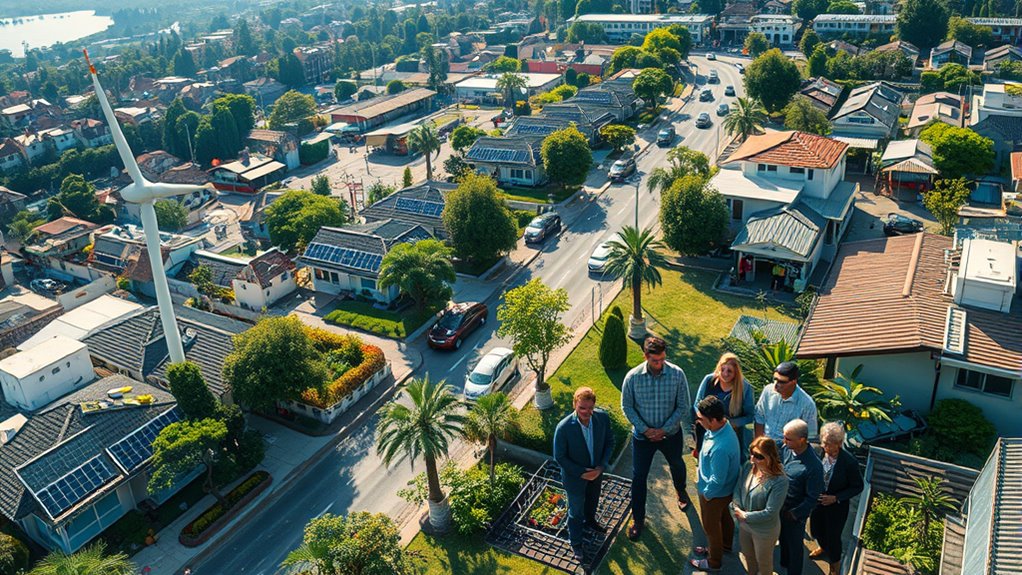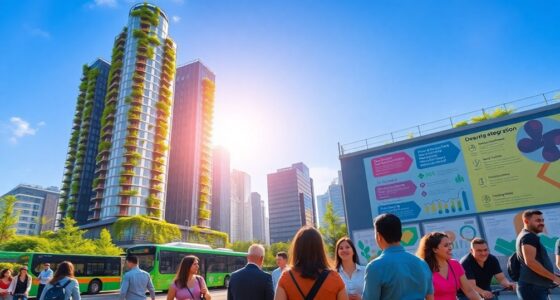If you're looking for top green tech startups, check out Solugen, which produces sustainable chemicals, and NotCo, known for plant-based alternatives using AI. Arcadia democratizes renewable energy access, while Carbon Limit innovates with CO2 capture in construction. Moment Energy repurposes EV batteries for clean energy storage, making it a key player in energy solutions. These startups are paving the way for a sustainable future, and there's so much more to discover about their innovative approaches.
Key Takeaways
- Solugen creates sustainable, carbon-negative chemicals using agricultural feedstocks, focusing on reducing greenhouse gas emissions through its Bioforge platform.
- NotCo utilizes AI to develop plant-based food alternatives, partnering with major retailers to promote sustainable consumption and reduce plastic waste.
- Arcadia democratizes renewable energy access via community solar subscriptions, utilizing technology to enhance energy consumption patterns and sustainability metrics.
- Moment Energy repurposes electric vehicle batteries for energy storage, providing reliable solutions for commercial applications and integrating renewable energy.
- Carbon Limit's CaptureCrete technology captures CO2 from the atmosphere to create concrete additives, generating carbon credits and promoting sustainable construction practices.
Solugen
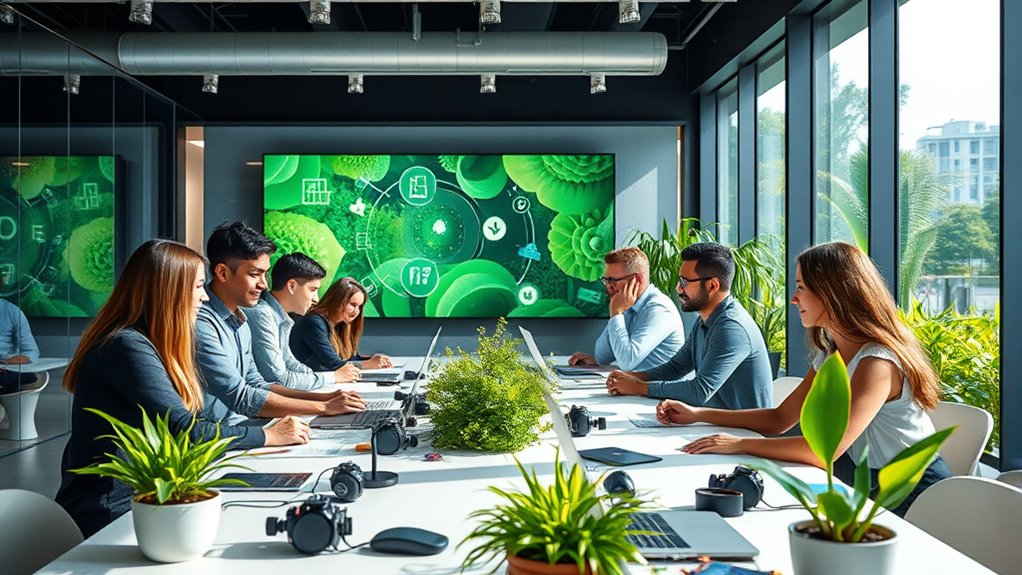
Solugen is leading the charge in sustainable chemical manufacturing, aiming for planet-scale change through innovative practices.
By using its Bioforge platform, you can see how they're transforming the chemical industry with carbon-negative molecules derived from sustainable agricultural feedstocks like corn sugar. This approach not only reduces greenhouse gas emissions but also enhances efficiency, yielding high outputs with minimal byproducts. Additionally, their methods contribute to lower environmental impact comparable to traditional fossil fuels. The company's commitment to sustainability aligns with the need to address deforestation and climate change, which can have far-reaching effects on ecosystems. Furthermore, their processes could be enhanced by tax implications that incentivize sustainable practices in various states. In addition, their innovative techniques could lead to improved electricity production through more efficient chemical processes.
Their modular design allows for quick deployment and localization of manufacturing, making it easier to meet diverse market needs.
With over $640 million raised in funding and strategic partnerships with industry leaders, Solugen is set to expand its product line into new sectors, pushing the boundaries of what sustainable chemistry can achieve. Additionally, their commitment to reducing greenhouse gas emissions aligns with the broader benefits of renewable energy solutions, which contribute to a more sustainable future.
NotCo
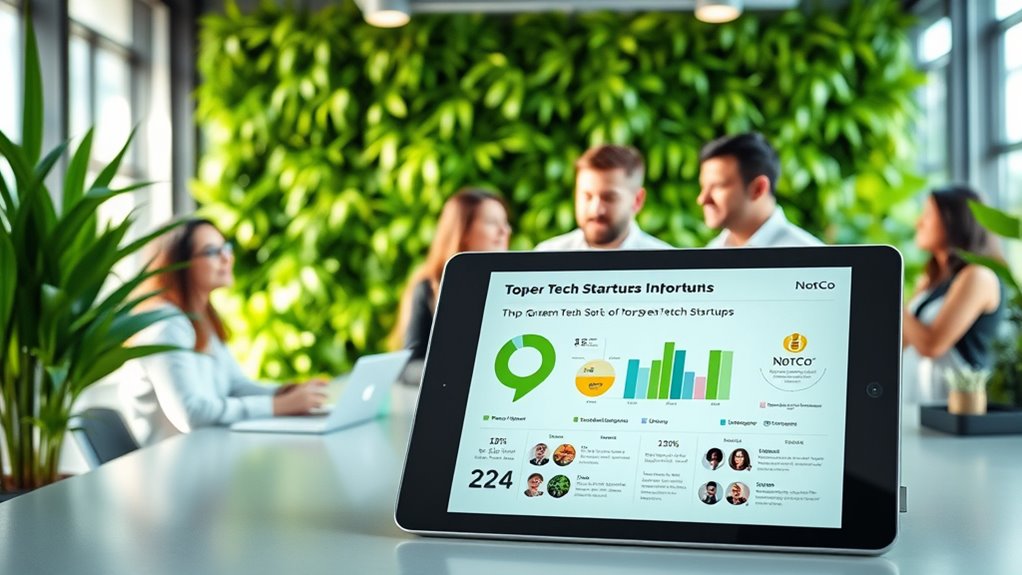
NotCo is revolutionizing the food industry by harnessing technology to create sustainable plant-based alternatives that don't compromise on taste or nutrition.
Founded in 2015 in Chile by Matias Muchnick, Karim Pichara, and Pablo Zamora, NotCo uses its innovative AI platform, Giuseppe, to analyze molecular structures and develop products like NotMilk, NotBurger, and NotMayo. This approach exemplifies environmental innovations that aim to improve sustainability in the food sector. Additionally, their methods align with the development of biodegradable materials, which are crucial in reducing plastic waste in the industry.
The company focuses on ingredient selection, using unique plants like pineapple and cabbage to mimic traditional animal products.
With strategic partnerships with major retailers like Walmart and Whole Foods, NotCo has expanded into markets such as Brazil, Argentina, and the US.
Their mission aligns with reducing environmental impact, making them a key player in the green tech landscape. Additionally, their products are crafted with a focus on nutrient density, ensuring that consumers receive essential vitamins and minerals while enjoying plant-based options.
Arcadia
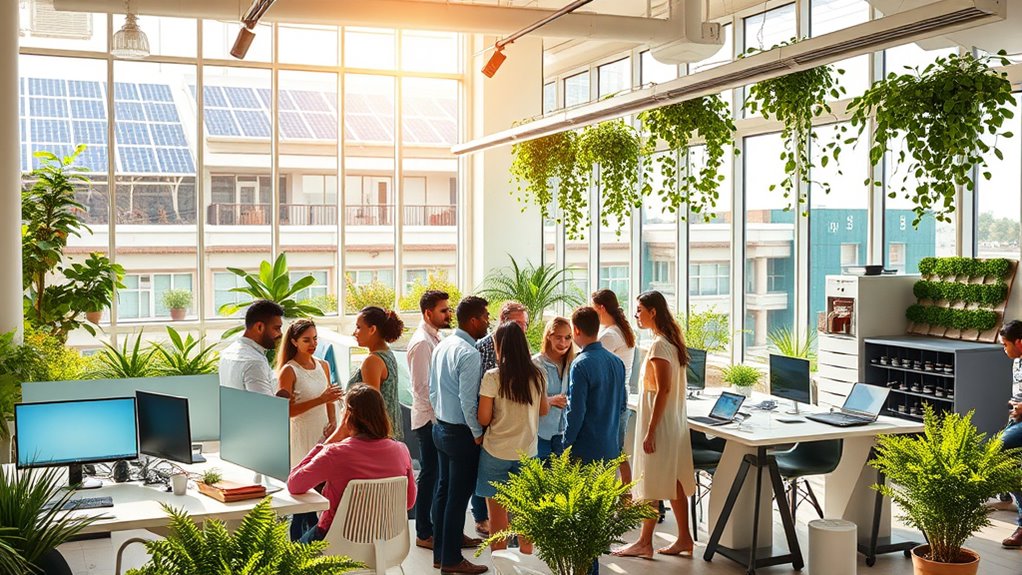
Building on the momentum of innovative solutions in the green tech sector, Arcadia is transforming how you access clean energy. Founded in 2014 in Washington D.C., this company aims to democratize renewable energy through advanced technology platforms.
With significant funding backing its growth, Arcadia's mission focuses on combating climate change with scalable solutions. Companies with high cultural intelligence can better adapt their strategies to meet diverse consumer needs, which aligns with Arcadia's approach to engaging with various communities. Utilizing integrated pest management in agricultural practices can also support sustainable energy initiatives.
You can benefit from their community solar subscriptions, which let you access renewable energy without needing to install solar panels. The emerging technologies in renewable energy are crucial for driving innovation in this field. Additionally, many smart utilities for homes, such as smart thermostats, can further enhance energy efficiency in conjunction with renewable energy solutions.
The Arc Platform offers on-demand access to your energy usage data, while AI-driven analytics improve your consumption patterns. Additionally, they provide sustainability reporting and carbon emission tracking to help you make informed decisions. Predictive modeling in energy consumption can further enhance your ability to engage in cleaner energy practices effortlessly.
Arcadia's solutions empower you to engage in cleaner energy practices effortlessly.
Carbon Limit
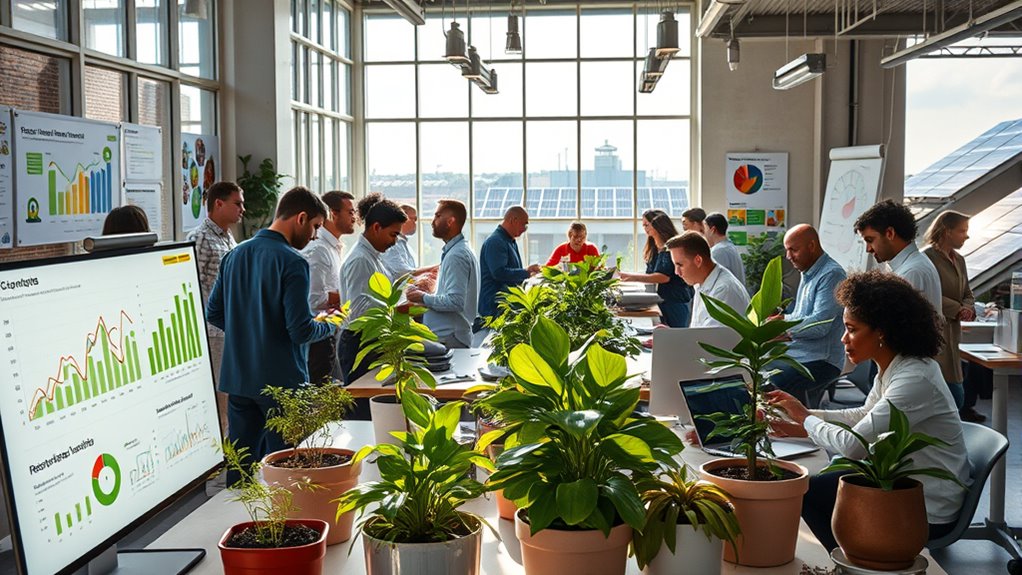
Carbon Limit is revolutionizing the construction industry with its innovative product, CaptureCrete, which captures and stores CO2 directly from the atmosphere.
Based in Boca Raton, Florida, and part of Florida Atlantic University's Tech Runway incubator, this groundbreaking concrete additive incorporates active mineral technology initially developed by NASA. It has already proven effective through collaborations, such as a pilot project with the Minnesota Department of Transportation.
CaptureCrete not only reduces carbon emissions but also converts CO2 into solid minerals, ensuring permanent storage. This scalable solution generates carbon credits, vital for offsetting emissions.
Carbon Limit's accolades, including awards from the Smart Building/Smart Construction Innovation World Cup and the U.S. Department of Defense, highlight its significant impact on decarbonizing the concrete industry. Additionally, the company emphasizes the importance of establishing clear boundaries to ensure effective implementation and collaboration in its projects.
Moment Energy
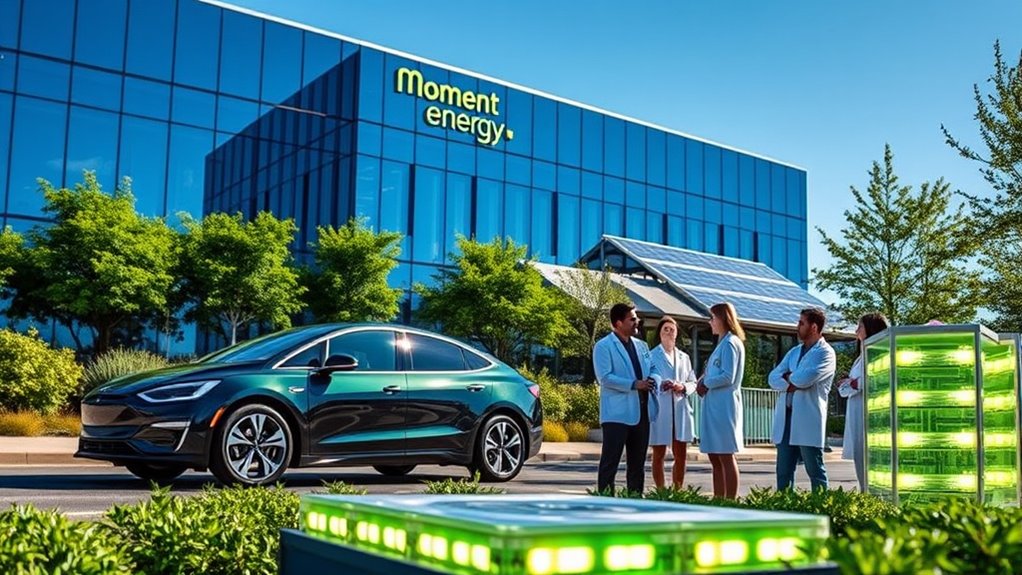
While many companies focus on traditional energy storage solutions, Moment Energy is carving out a niche by repurposing retired electric vehicle batteries to provide clean, affordable, and reliable energy storage.
Founded in 2019 in Coquitlam, British Columbia, this innovative startup began operations with just four co-founders and has since expanded to over 43 team members.
Moment Energy's flagship products, the Flora BESS and Luna BESS, cater to commercial and industrial applications, starting with a minimum capacity of 400 kWh.
Their systems offer vital features like peak shaving, load shifting, EV charging support, renewable energy integration, arbitrage, and backup power.
Tongwei Solar
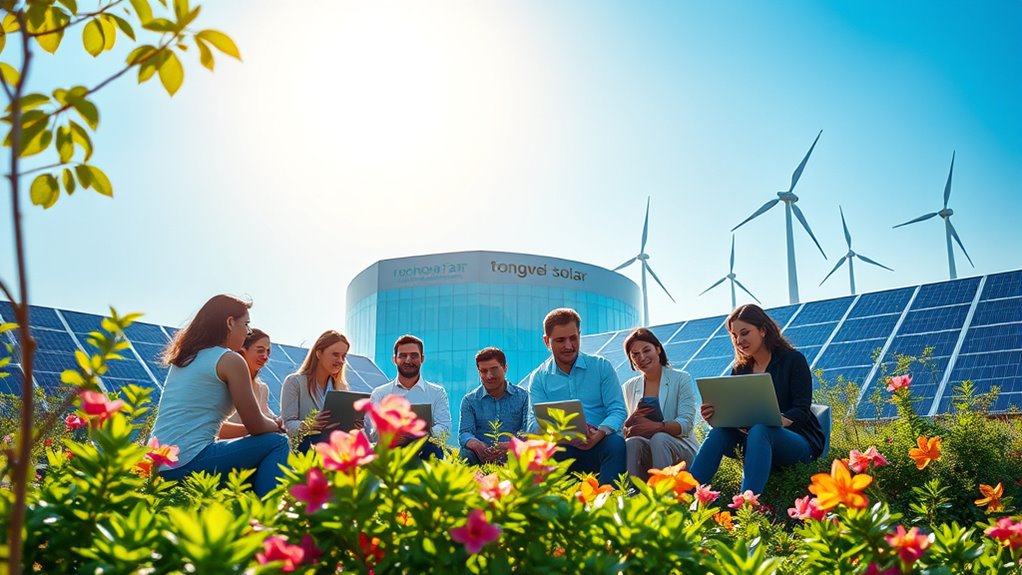
Tongwei Solar stands out as a key player in the renewable energy sector, blending its rich history in agriculture with innovative solar technology. Founded in 1984, the company shifted focus to solar in 2005, mastering the entire manufacturing process from silicon ingots to modules.
With a presence in over 70 countries, Tongwei consistently leads in global solar cell shipments. Their advancements, like PERC technology and bifacial panels, enhance efficiency and energy output. As a result, their products contribute to a significant reduction in greenhouse gas emissions, aligning with global sustainability efforts. Furthermore, their commitment to low-cost custodians in their supply chain strategies ensures competitive pricing while maintaining high-quality standards. Additionally, the company emphasizes the importance of renewable energy investment to foster innovation and expand its technological capabilities. To support their growth, Tongwei adheres to strict IRS regulations regarding financial practices, ensuring compliance while pursuing their ambitious goals.
You'll appreciate their production capacity, aiming for 130-150 GW from 2024 to 2026, supported by high-purity silicon manufacturing. Additionally, their commitment to energy-efficient technology promotes sustainable living practices and aligns with global environmental goals.
Frequently Asked Questions
What Are the Main Benefits of Investing in Green Tech Startups?
Investing in green tech startups offers you significant benefits.
You're contributing to reducing greenhouse gas emissions and promoting sustainable practices, which is crucial for the environment.
Plus, as demand for eco-friendly solutions grows, these investments can yield substantial financial returns.
Government incentives further enhance profitability, making it an attractive opportunity.
How Can I Get Involved With Sustainability Initiatives?
You can get involved with sustainability initiatives by participating in community projects or joining local organizations focused on environmental issues.
Attend workshops or seminars to learn more and connect with like-minded individuals.
Volunteer for citizen-led initiatives, like participatory budgeting, to influence local decision-making.
Engaging online through platforms that promote e-democracy can also amplify your voice.
Don't forget to share your knowledge and encourage others to join in making a positive impact!
What Trends Are Shaping the Future of Green Technology?
You'll notice several trends shaping the future of green technology.
Carbon capture innovations, like Direct Air Capture, are advancing rapidly. AI plays a crucial role in enhancing sustainability through better energy management.
Renewable energy sources are becoming integral, while circular economy practices focus on reducing waste.
Additionally, blockchain offers transparency in environmental initiatives, boosting efficiency.
Staying informed about these trends can help you engage more effectively with the evolving green tech landscape.
Are There Government Incentives for Green Tech Investments?
Yes, there are several government incentives for green tech investments that you can take advantage of.
Tax breaks, grants, and subsidies specifically for renewable energy projects can significantly reduce your initial costs.
Many governments also offer favorable regulations that encourage the adoption of sustainable technologies.
How Do Green Startups Impact Local Economies?
Green startups are like economic superheroes, swooping in to save local economies! They create a whirlwind of jobs, ignite innovation hubs, and diversify workforces with fresh skills.
By injecting capital into sustainable projects, they stimulate the economy and foster a vibrant entrepreneurial ecosystem. Plus, their focus on sustainable infrastructure enhances community resilience.
You'll witness reduced carbon footprints and improved air quality, making your neighborhood a greener, healthier place to live and work!
Conclusion
In the race toward a sustainable future, these top green tech startups are like the modern-day heroes of our environmental saga. Solugen, NotCo, and their peers are crafting innovations that could turn the tide against climate change, much like David facing Goliath. As you explore their groundbreaking solutions, imagine a world where clean energy flows as freely as rivers, and our planet thrives in harmony. Together, they're sowing the seeds for a greener tomorrow—let's nurture that vision.
